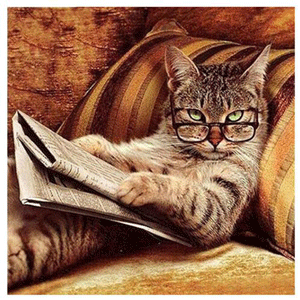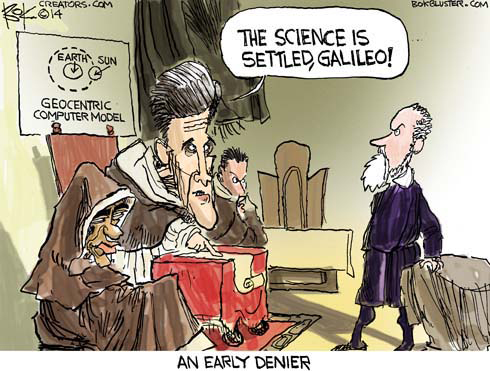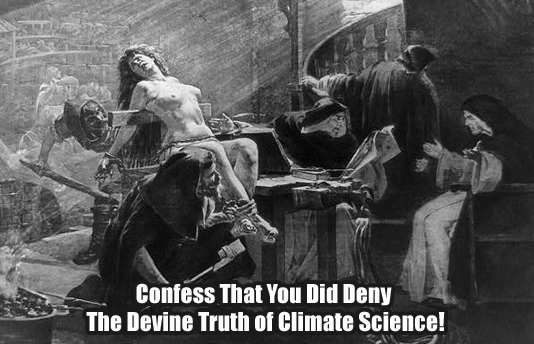
Peer review
U bent hier: inhoudsopgave -wetenschap- peer review
Afkorting of begrip onbekend ? Raadpleeg ons milieuwoordenboek !
Follow@plattezaken en Facebook of Linkedin
Aan het slot van een uitgebreid artikel over de zin en onzin van peer review processen, eindigt Richard Smith (2006) met de volgende conclusie:
"So peer review is a flawed process, full of easily identified defects with little evidence that it works. Nevertheless, it is likely to remain central to science and journals because there is no obvious alternative, and scientists and editors have a continuing belief in peer review. How odd that science should be rooted in belief".
From: Phil Jones, Director of the Climate Research Unit at East Anglia University:
To: Many. March 11, 2003
“I will be emailing the journal to tell them I’m having nothing more to do with it until they rid themselves of this troublesome editor.”
Prof Jones appears to be lobbying for the dismissal of the editor of Climate Research, a scientific journal that published papers downplaying climate change.
e-mail to: Michael Mann (Pennsylvania State University). July 8, 2004
"I can't see either of these papers being in the next IPCC report. Kevin and I will keep them out somehow — even if we have to redefine what the peer-review literature is!"
The IPCC is the UN body charged with monitoring climate change. The scientists did not want it to consider studies that challenge the view that global warming is genuine and man-made.
e-mail to "All tthree", Feb. 21, 2005
I’m getting hassled by a couple of people to release the CRU station temperature data. Don’t any of you three tell anybody that the UK has a Freedom of Information Act.
IPCC
Christopher Booker (2018) beschrijft in detail dat, alhoewel het IPCC zich er op voorstaat dat ze in hun rapportages uitsluitend gebruik maken van artikelen in peer reviewed tijdschriften, uit analyses is gebleken dat in sommige van hun rapporten wel tot 33% van de geciteerde artikelen daar niet aan voldeden, met als gevolg allerlei "ongelukken" in hun rapportages, zoals o.a. het zeer snel afsmelten van de Himalaya ijskap.
The United Nations IPCC also publishes a research review in the form of a voluminous, occasionally-updated report on the subject of climate change, which the United Nations asserts is “authored” by approximately 600 scientists. These “authors” are not, however – as is ordinarily the custom in science – permitted power of approval the published review of which they are putative authors. They are permitted to comment on the draft text, but the final text neither conforms to nor includes many of their comments. The final text conforms instead to the United Nations objective of building support for world taxation and rationing of industrially-useful energy (bron hier).
Peer reviewers en (gebrek aan) kennis van statistiek
Zonder grondige kennis van statistiek gaat het vaak mis, zelfs in het zgn. "peer reviewed" tijdschrift Nature. Er was een klimaat-amateur voor nodig om fouten in dit artikel (bron volgt nog) over opwarming van de zee aan de kaak te stellen. De reviwers van Nature hadden het niet gezien. Het artikel is een jaar na dat "teruggetrokken", maar de media hadden de ten-onrechte alarmistische inhoud al verspreid.
Peer review is in de klimaatwetenschap verworden tot "Pal review",
zo betoogt Patrick Michaels hier. (zie hier indien de link is vebroken).
Wordt vervolgd..................
Consensus in "De Klimaatwetenschap"? Hoe dit idee post vatte.
In 2004 publiceerde Science (vol. 306, p. 1686) een artikel onder de titel The scientific consensus on climate change waarin werd vastgesteld dat dissidentie in de wetenschappelijke literatuur nagenoeg onbestaande is. In deze veelgeciteerde publicatie wordt gesteld dat die consensus heel goed fout kan zitten, maar niettemin wordt toch betoogd dat wij ons moeten gedragen alsof de consensus indicatief is voor waarheid (bron: Jos Verhust, 2007). Sinds Climatgate hebben we enig inzicht gekregen hoe die consensus door sommige klimaatwetenschappers d.m.v. obscure "peer-review" procedures wordt bewaakt als een middeleeuws fort. Ook in de rapporten van het IPCC.
Censuur
Berkhout (2020) formuleert het als volgt (zie de schuin gedrikte tekst):
De geschiedenis van de wetenschap laat keer op keer zien dat nieuwe inzichten niet komen van volgers, maar van andersdenkenden. Iedereen kent uit het verleden de vernieuwingen van Copernicus (1473-1543) en van Galilei (1564-1642) in de astronomie.
 |
Bjørn Lomborg, versus Scientific American: Hij (en zijn uitgever Cambridge University Press) werden verketterd vanwege zijn boek The Skeptical Environmentalist. Met name Scientific American "nagelde hem" , in een 11 pagina's lange tirade, "aan het kruis" als een echte ketter, zoals de Kerk vroeger Galileo vervolgde. Zijn pogingen tot verweer werden door het tijdschrift ernstig gefrustreerd. Zie Michael Crichton (2003, pagina 11) voor de details en zijn droevige conclusie: "Of course, any scientist can be charged as Galileo was charged. I just never thought I’d see the Scientific American in the role of Mother Church".
|
Meer recentelijk kunnen Nobelprijswinnaars zoals Watson, Crick en Wilkins in de microbiologie (1962) worden genoemd. Zij keken allen kritisch naar de heersende consensus en durfden een andere weg in te slaan. Vooruitgang zonder hen was niet mogelijk geweest. In de klimaatwetenschap leven we qua censuur weer in de middeleeuwen en worden andersdenkenden geëxcommuniceerd.

(bron: Berkhout, G., Audiatur et Altera Pars – CLINTEL Manifest, open brief aan de Koninklijke Nederlandse Akademie van Wetenschappen (KNAW), alsmede een Engelstalige versie aan de Europese (EASAC) en wereldwijde (IAP) overkoepelende organisaties van de Academies van Wetenschappen. In deze brief wordt de zorg uitgesproken dat in de klimaatwetenschap de academische vrijheid vrijwel verdwenen is. De brief is gebaseerd op CLINTEL’s wetenschappelijke manifest, Audiatur et Altera Pars, dat bestaat uit tien stellingen. Hierin worden de regels geformuleerd van onafhankelijke wetenschapsbeoefening. Daaraan moet al het wetenschappelijk onderzoek voldoen. Deze stellingen volgen hieronder, met een korte toelichting over de naleving daarvan in het klimaatonderzoek. Climategate.nl, 28-6-2020. )
Ook met betrekking tot censuur bij een peer review proces duikt Michael Mann weer op.
Zie Roger Pielke , Climate Change Dispatch, 22-1-2024, Bombshell Evidence Shows Michael Mann Trying To Manipulate Peer-Review Process
Peer reviewed kan betekenen dat het met een kans van ca. 50% onwaar is of niet repliceerbaar en niet geschikt om politiek beleid op te baseren.
I would estimate 90+ % of "climate science" papers are of no scientific value.
(Tony Heller, 20-1-2024 op twitter).
Samenvatting van een rapport van Donna Laframboise: Peer Review — Why Skepticism Is Essential.
"Science is currently in the grip of a ’reproducibility crisis’ so severe that the editor of a prominent journal has declared that ‘much of the scientific literature, perhaps half, may simply be untrue’. Media coverage declaring that ’science is broken’ has become commonplace.
Prior to the 2009 Copenhagen climate summit, Peter Doherty, winner of the Nobel Prize in medicine, defended the Intergovernmental Panel on Climate Change (IPCC) from its critics. The IPCC involves hundreds of scientists and ‘draws its evidence ex- clusively from peer-reviewed, published scientific literature’, he wrote.
Around the same time, the IPCC chairman was asked if an Indian environment ministry report might alter the IPCC’s pessimistic view of Himalayan glaciers. The ‘IPCC studies only peer-review science’, Rajendra Pachauri replied dismissively. Until the report’s data appears in ‘a decent credible publication’, he said, ‘we can just throw it into the dust- bin’.
Peer-reviewed research is reliable, so the reasoning goes. Non-peer-reviewed research is not. The IPCC makes exclusive use of the former, therefore its conclusions can be trusted. This argument has long been used to deflect criticism and to repel contrary climate perspectives.
But behind it lies a dubious assumption: that academic publications are a sound foundation on which to base real-world decisions. In fact, science is currently in the grip of a ’reproducibility crisis’ so severe that the editor of a prominent journal has declared that ‘much of the scientific literature, perhaps half, may simply be untrue’.
Media coverage declaring that ’science is broken’ has become commonplace. Part 1 of this report demonstrates that a journal’s decision to publish a paper provides no assurance that its conclusions are sound. Large swathes of peer-reviewed work contain errors. Fraudulent research makes it past gatekeepers at even the most prestigious journals. And while science is supposed to be self-correcting, the process by which this occurs is haphazard and byzantine.
A policy cannot be considered evidence-based if the evidence on which it depends was never independently verified. Peer review does not perform that function. News from the worlds of astrobiology, ecology, economics, chemistry, computer science, management studies, medicine, neuroscience, psychology, and physics all tell the same tale: ’peer-reviewed’ does not equal ’policy-ready.’r
Part 2 of this report invites us to re-examine what we think we know about the climate. While good scientists have always understood that peer review doesn’t certify accuracy, IPCC officials – supported by politicians, activists, and journalists – think global climate decision-making should rest on this shaky foundation. If half of all peer-reviewed research ‘may simply be untrue’, half of all climate research may also be untrue. The policy implications of this idea are immense."
Lees hier het hele rapport van Donna LaframboiseLiteratuur:
- Berkhout, G., Audiatur et Altera Pars – CLINTEL Manifest, open brief aan de Koninklijke Nederlandse Akademie van Wetenschappen (KNAW), alsmede een Engelstalige versie aan de Europese (EASAC) en wereldwijde (IAP) overkoepelende organisaties van de Academies van Wetenschappen. In deze brief wordt de zorg uitgesproken dat in de klimaatwetenschap de academische vrijheid vrijwel verdwenen is. De brief is gebaseerd op CLINTEL’s wetenschappelijke manifest, Audiatur et Altera Pars, dat bestaat uit tien stellingen. Hierin worden de regels geformuleerd van onafhankelijke wetenschapsbeoefening. Daaraan moet al het wetenschappelijk onderzoek voldoen. Deze stellingen volgen hieronder, met een korte toelichting over de naleving daarvan in het klimaatonderzoek. Climategate.nl, 28-6-2020.
- Booker, Christopher, Global Warming: a case study in Group Think:
How science can shed new light on the most important "non-debate" of our time, Global Warming Policy foundation-GWPF report no. 28, 2018.
-
Ioannidis, John, P. A., Why most publishes research findings are false, PLoS Med. 2005, Aug 2(8): e124- ----Published online 2005 Aug 30. doi: 10.1371/journal.pmed.0020124
- Laframboise, Donna (2016), Peer review, Why scepticism is essential, GWPF- report no. 20 9or 29 ?), 2016, ISBN 978-0-9931189-3-7
- Michaels, Patrick,
Peer Reviw And "Pal Review" In Climate Science, Forbes Media, 16-6-2011 (zie hier indien de link is vebroken).
- Pielke, Roger Jr., Peer review’ in de klimatologie – een nieuw dieptepunt (Een klokkenluider deelt schokkende details over de corruptie van peer review in de klimaatwetenschap). climategate.nl29-8-2023
- Pielke, Roger Jr, Climate Change Dispatch, 22-1-2024, Bombshell Evidence Shows Michael Mann Trying To Manipulate Peer-Review Process
-
Pierce, Fred, Climate change emails between scientists reveal flaws in peer review, The Guardian, Febr. 2nd 2010.
- Pronk, Reynier, Perverse prikkels, Climategate.nl, 24-9-2019
- Smith, Richard (2006) , Peer review: a flawed proces at the heart of science and journals, Journal of the Royal Society of Medicine, J R Soc Med. 2006 Apr; 99(4): 178-182
Mail ons uw commentaar, aanvullingenen en correcties !
Follow@plattezaken
en Facebook of Linkedin